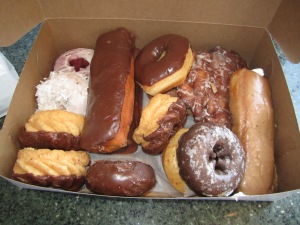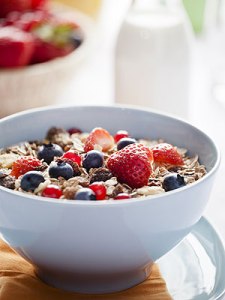Cookies, Cake, Sweet Potatoes, Brown Rice, French Fries, Oatmeal, Couscous……what do these foods have in common? They are what we call carbohydrates or as most people refer to them “carbs”. There is a big difference most people don’t know and that is they are not all created equal. The difference is some of those are Simple Carbohydrates while the others are Complex Carbohydrates. Many people don’t have any idea what the difference between them is and a lot of people think it’s best to steer clear of carbs because they think they will gain weight if they don’t. Truth is, we need carbs in our diets. We don’t need to be scared of them or stay away from them at all! I encourage you to eat them, but let’s discuss which ones to eat, which ones to have in moderation and which ones to steer clear of altogether!
As carbs pass through the digestive system, they are broken down into glucose. This is your body and brain’s primary fuel and energy source. What’s the difference between a Simple Carb and a Complex Carb? Simple Carb are what I like to call the BAD carbs! Simple carbs are broke down by the body very quickly and can be found naturally in foods like milk, vegetables and fruits but they’re also found in processed and refined sugar. Now understand that simple carbs, like fruit and vegetables, are simple carbs you can enjoy without worry but the other simple carbs like candy, cakes, cookies and other things like that are ones to stay away from.
 A scientific explanation of this is a simple carb are small molecules consisting of a monosaccharide or two monosaccharides linked together. Anything bigger than that is called a complex carbohydrate. What is a monosaccharide you ask? Well simply put it’s a single sugar. For example glucose is a monosaccharide — and it’s a good sugar because it’s the type of sugar your body and brain use for fuel every day. Other monosaccharides include fructose, which is found in fruits and vegetables, and galactose, which is found in milk. The great thing is that none of these sugars are bad for you. Single sugars can merge together to form disaccharide (aka two sugars). Lactose (milk sugar), Sucrose (table sugar) and Maltose (malt sugar – cereal) are three examples of these.
A scientific explanation of this is a simple carb are small molecules consisting of a monosaccharide or two monosaccharides linked together. Anything bigger than that is called a complex carbohydrate. What is a monosaccharide you ask? Well simply put it’s a single sugar. For example glucose is a monosaccharide — and it’s a good sugar because it’s the type of sugar your body and brain use for fuel every day. Other monosaccharides include fructose, which is found in fruits and vegetables, and galactose, which is found in milk. The great thing is that none of these sugars are bad for you. Single sugars can merge together to form disaccharide (aka two sugars). Lactose (milk sugar), Sucrose (table sugar) and Maltose (malt sugar – cereal) are three examples of these.
So what happens when we consume Simple Carbs? Well they work their way through our stomachs and small intestines and once there enzymes break down the simple sugars into individual elements that go through the walls of our small intestines into the blood stream. If your body doesn’t use it for fuel or energy it is converted to fat and stored in adipose tissue.
Simple carbs like milk, fruit and veggies are a great source of vitamins and minerals – the other simple carbs that are processed and refined like candy, sodas, cakes and cookies are ones to steer clear of. Refined sugars provide calories, but they lack vitamins, minerals, and fiber. Such simple sugars are often called “empty calories” and can lead to weight gain.
 Now let’s talk about the GOOD carbs! The Complex Carbs! Complex carbs are made up on three single sugar molecules, which include starches, maltose and cellulose. Even though starches are considered a complex carb, like a simple carb it causes your blood sugar to rise in a short time. Cellulose is the main source of dietary fiber and any starch from these plants is broken down, but the fiber slows the absorption which is good because the starches that are there don’t have quite as strong of an effect on your blood sugar.
Now let’s talk about the GOOD carbs! The Complex Carbs! Complex carbs are made up on three single sugar molecules, which include starches, maltose and cellulose. Even though starches are considered a complex carb, like a simple carb it causes your blood sugar to rise in a short time. Cellulose is the main source of dietary fiber and any starch from these plants is broken down, but the fiber slows the absorption which is good because the starches that are there don’t have quite as strong of an effect on your blood sugar.
What are some examples of complex carbs? A few of my favorites include sweet potatoes, brown rice, oatmeal, and red potatoes – but some other great examples of complex carbs are whole wheat pasta, pumpkin, squash, yams, barley, beans and couscous.
How do you apply this to your plate? Well, let’s just say that eating simple carbs like cake and cookies are fun and can be enjoyed in moderation, but to keep your waistline trim and your overall health good we should steer clear of these carbs as much as we can. As for the complex carbs – enjoy them. Don’t skip this great source of nutrition, you need the fiber, vitamins and minerals and are a great source of energy!
Stay tuned…..in my next post I will be discussing FATS and how to incorporate them in your diet! Just like carbs, they’ve been given a bad rap!
E